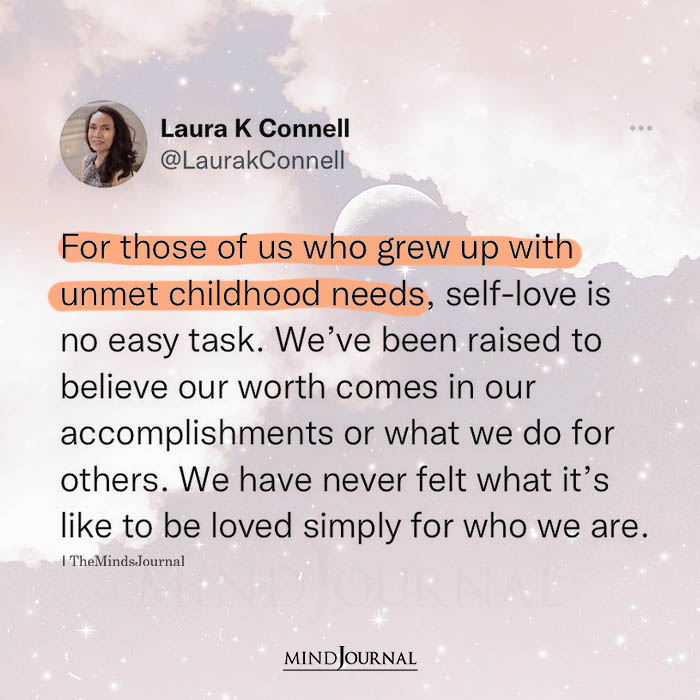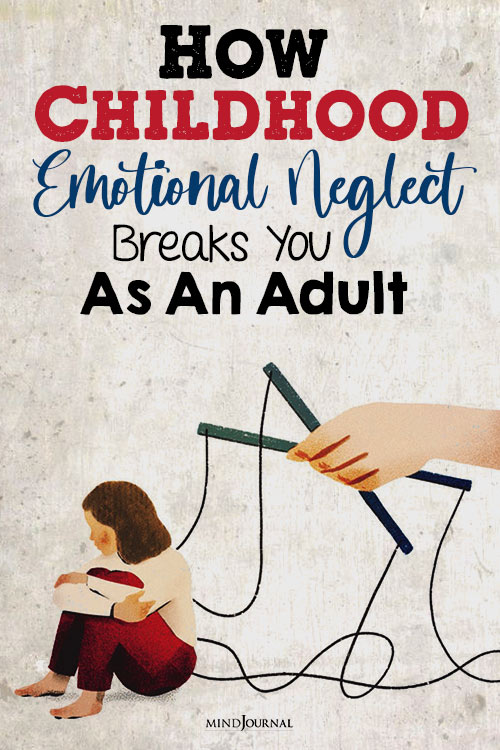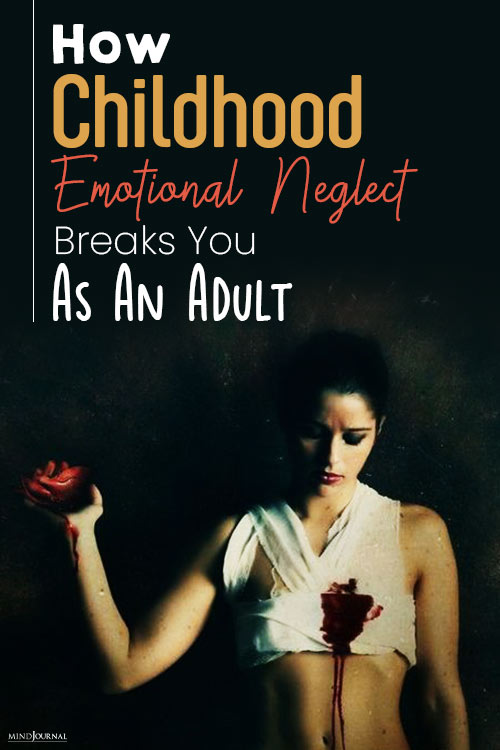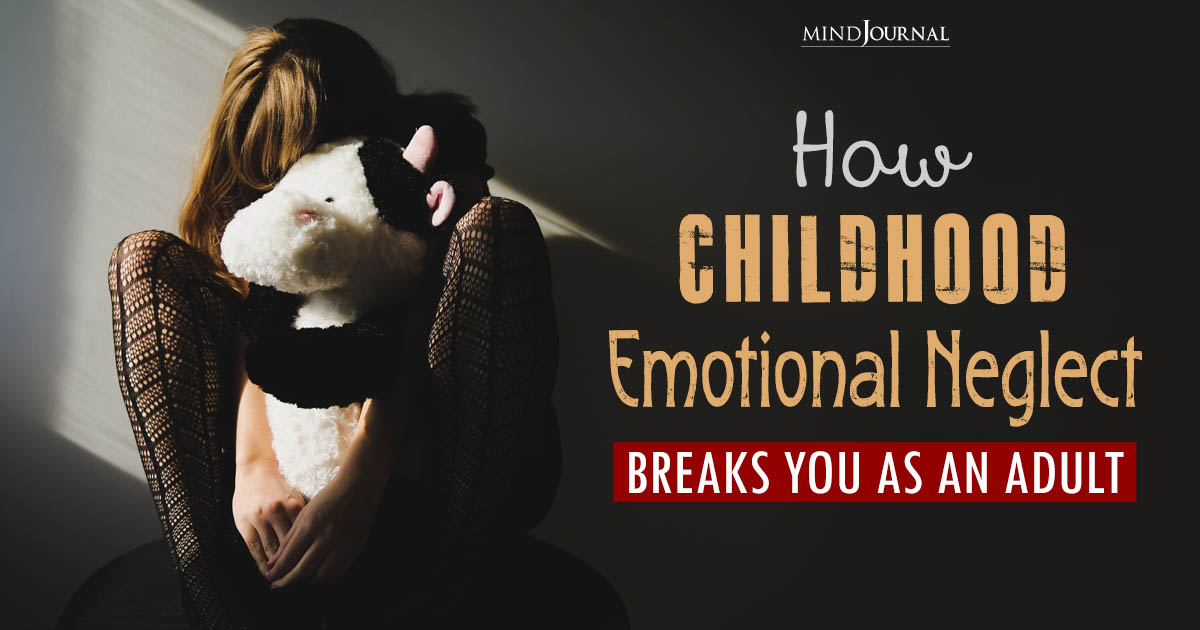Childhood emotional neglect is a silent form of abuse that no one talks about. The pain of having your own parents avoid and overlook your basic emotional needs or invalidating your emotional experiences can damage you significantly.
When a parent is not emotionally connected to their child, whether intentionally or not, it becomes difficult for the child to see their own selves in a positive light. As they grow older, they drown in self-doubt, low self-esteem, neediness and a negative sense of self.
But does the failure of emotionally unavailable partners turn the child into a failure as an adult?
Related: The Lifelong Effects of Childhood Neglect By Parents
I want mommy!
Let me tell you a little story. Few years ago I met an amazing woman and I knew in my heart she was ‘The One’ for me. She was perfect and our relationship just felt right. That we were meant to be together. She was loving, caring, supportive, selfless and always putting my happiness first before hers. What more could I ask for, right?
The problem started when I latched onto her like a parasite and started sucking the happiness out of her. The problem started when I realized my happiness was tied only to her. Being a loner all my life, I saw her as my only solution, my sole path to happiness.
So, I became greedy for happiness. I became needy, insecure, jealous, doubtful, demanding, manipulative, controlling and everything else I could become to keep her to myself.
But I failed to realize that she was already loving and caring for me willingly. But I wanted her all to myself. So I pushed her and pushed her and pushed her until I broke her love for me. I drove away the woman I wanted the most to love me, even when she was already loving me.
Why?
I wanted to fill the gigantic void in my life left by my mother’s emotional neglect with the love of a woman who simply wanted to have a healthy, loving relationship. I wanted to use my partner’s love to heal all the pain and trauma left by my mother’s neglect.
The poor girl never lasted a chance. I failed to be the man, the partner, my girl wanted to be because my parents failed to meet my emotional needs as a child.
This is what childhood emotional neglect in adults look like. Attention seeking behavior in adults is one of the most common childhood emotional neglect symptoms.

What childhood emotional neglect does to you
Growing up as a neglected child, I was always hungry for love, but never open about my needs. I kept my emotional needs bottled up and kept to myself all my life. People started calling me shy and introverted, but deep down I never felt like I belonged anywhere.
I never felt connected to anyone. Of course I had friends, but socializing was a draining experience, especially because I was a people pleaser. I agreed to everything others said simply because I wanted them to like me. To validate my feelings. And let me tell you, THAT is exhausting.
And so when I met the girl I fell in love with, the same toxic patterns ensued in my romantic relationship. I never openly communicated what I wanted from the relationship out of fear that she would leave me.
I never voiced my opinions, I always hid my real emotions to avoid arguments and I manipulated her without any remorse to have my emotional experiences validated.
I distorted the truth and pretended to be the victim at every opportunity to appeal to her strong sense of empathy.
I believed the weaker I appeared, the more she would love me. Well, isn’t that the recipe for a healthy, loving relationship?
But that’s not all. I had monumental expectations from her. I was insecure and always wanted her to pamper me. The truth is I wanted her to give me the love my mother never did. My insecure attachment made me increasingly needy and selfish.
I was more concerned about making her meet my needs than fulfilling her emotional needs from the relationship, even though I kept constantly pleasing her. But no matter what she did, I was never happy with it.
I always wanted more – more love, more attention, more validation – to fill that dark empty abyss in my heart left by my mother.
All I wanted was to protect myself from all the pain and trauma I experienced in my childhood and in doing so, I ruined a perfectly good relationship with a perfectly good woman.
I now realize all the mistakes I made in my past relationship. But I am scared to get into another one as I am filled with doubt that I will repeat the same toxic patterns in my future relationships.
THIS is what childhood emotional neglect does to you in your adulthood!
Related: How Does Emotional Neglect Affect A Child: 5 Steps
How childhood emotional neglect screws you as an adult

If you have grown up with emotional neglect and if your emotional needs were invalidated as a child, then chances are you are ill-equipped to deal with your emotions, like me.
What’s worse, when you become a parent yourself, you are likely to repeat the same parenting style and will end up failing to meet your own child’s emotional needs.
But wait, there’s more. A lot more challenges that you may face as an adult with childhood emotional neglect. Here are some signs of childhood emotional neglect you may face as an adult.
1. You feel lonely all the time
Even when you are surrounded by friends and family, you feel alone. As you are unable to develop healthy attachments and genuine connections, you feel isolated and withdrawn. And people end up calling you introverted without realizing the trauma you went through.
2. You are bad at relationships
You don’t know how to build healthy romantic relationships as an adult. Being needy and insecure, you constantly focus on pleasing your partner and avoid your own needs. You never share your true emotions which keeps you and your partner from being emotionally close.
Although you may be a good boyfriend or girlfriend, you don’t know how to maintain a relationship in the long run as you are afraid of being vulnerable, neglected or abandoned.
As you have limited capacity to share or are reluctant to share your fears and insecurities, socializing appears as a chore to you. You simply go through the motions like any other task.
Socializing is not a rewarding experience for you, but an exhausting one. As you pretend to be someone you think others want you to be in social settings, it leaves you feeling drained.
Wait, I am not done. I hate to be the bearer of bad news, but here are some other difficult emotions and issues you may struggle with as an adult growing up with childhood emotional neglect:
- Low self-esteem
- Sensitivity towards rejection
- Negative self image
- Perfectionism
- Guilt & shame
- Emptiness
- Trouble trusting others
- Attachment insecurities
- Fear of intimacy or neediness
- Being emotionally unavailable
- Codependency in relationships
- Lack of joy or unhappiness
- Difficulty expressing feelings
- Being highly critical and judgemental of others and self
- Lack of empathy
- People-pleasing behavior
- Difficulty asking for help
- Mood swings
- Intrusive thoughts
- Nightmares & flashbacks
- Self-blame
- Difficulty loving others and self
Whoa there, buddy! That’s not all. You should be so lucky to get off so easily. Emotional neglect in childhood messes you up real good and the best part (sense the sarcasm) is that it affects both your heart and mind.
Related: 8 Things You Can Relate To If You Were Emotionally Neglected As A Child
Psychological effects of childhood emotional neglect
So how does childhood emotional neglect affect your psyche? Go ahead and take a look at the most common psychological effects you may develop as an adult, thanks to your parents emotional unavailability.
- Anxiety
- Depression
- Post-traumatic stress disorder (PTSD)
- Aggressive behaviors
- Fears and insecurities
- Lack of emotion regulation
- Hyperactivity
- Substance abuse
- Social isolation and withdrawal
- Apathy
- Disconnection from self
- Poor self-discipline
- Eating disorders
- Self-harm and suicidality
That sounds about right. If that doesn’t make you feel better I don’t know what would. Yup, our parents really messed us up. Didn’t they? So now what?

Healing. But it never comes easy
Do I blame my parents for how I turned out as an adult? Weirdly enough, no. We are all human, struggling with our own issues and navigating through all the shit that life throws at us.
Who are we to judge others when we are not perfect ourselves? Yes, parents are supposed to take care of their children, meet their every need, love and care for them, support and validate them and help them become mentally healthy adults.
Yes, in a fair world. But that’s not the world we live in.
We live in a world where we don’t talk about mental health. A world where we fail to realize that our parents were also subjected to abuse and childhood emotional neglect when they were children.
Their own childhood trauma had distorted their attachment styles and parenting styles, making them adults with poor parenting skills. Sure, they should have sought help and gave their children a better childhood than the ones they got.
But the thing about abuse and trauma is that it’s not always easy to seek help. It’s not always easy to overcome it. So instead of blaming our parents for however we have turned out to be, we need to take charge of our own lives and heal ourselves.
That is our first responsibility towards ourselves.
How to heal from childhood emotional neglect?
Self-healing is the best thing you can do for yourself if you have been a victim of childhood emotional neglect. But how to heal from childhood emotional neglect as an adult?
Let’s take a look at a few steps to get you started on your healing journey.
1. Seek therapy
Let’s get real, no one wants to see a therapist. But if you have experienced childhood emotional neglect and abuse then make sure to seek professional help, especially if you are struggling with mental health issues like stress, anxiety, depression, PTSD etc.
Talking to a therapist or a psychologist can help you overcome the trauma and help you identify, acknowledge, express and manage your emotions in a healthy way. Therapy can also help you improve your attachment style, parenting style and build better relationships.
Learn to be more conscious and aware of your thoughts, emotions and behaviors. Understanding yourself better will empower you to respond to your needs better.
By practicing mindfulness exercises, like meditation, you can connect with yourself and others in a healthy manner. This will also help you identify your subtle feelings more accurately and become aware of triggers to improve emotion regulation.
Related: 7 Steps to Healing Childhood Trauma as an Adult
3. Be your own parent
Reparenting is a form of psychotherapy where a therapist or you yourself assume the role of a new parental figure for your adult self. As a parent to yourself, you give yourself all the things you never received as a child – love, care, support, validation, admiration, appreciation etc.
An advanced form of self-love, reparenting can help you develop healthier attachment styles, overcome insecurities and cope with other psychological effects of childhood emotional neglect.
Simply focus on your unmet childhood emotional needs and address your own struggles, fears and limitations.
There are few more things that you can do to heal yourself. Here are some coping strategies for overcoming childhood emotional neglect:
- Learn to communicate your emotions openly and honestly, especially in romantic relationships.
- Acknowledge and accept your emotions as they are, instead of suppressing them.
- Focus on your emotional needs, acknowledge them as valid and take steps to meet them.
- Be compassionate, kind and loving towards yourself. Practice self-care, avoid self-criticism and forgive yourself.
- Allow people to get close to you and try to build a more intimate connection with your romantic partner.
- Be more resilient and develop the mental strength to get past setbacks.
- Practice self-discipline to break toxic thought and behavior patterns.
- Follow a healthy lifestyle, such as avoiding excessive consumption of alcohol or recreational drugs.
- Ask for help from trusted loved ones and be open to accepting help when they reach out.
But most of all, remember that it will take time. Healing is a journey, a process, that will be riddled with challenges. Some days will be easier than others, some days will feel a lot worse. So be patient.
Like a wound on your body, your emotional wounds will also need time to heal, but be rest assured they will heal, if you want them to.

Accept yourself
Accept your broken self. Accept your flawed self. Accept your worst self. Accept your emotions, accept your pain, and accept your will to rise from the ashes. Accept your determination to rise above your trauma.
Childhood emotional neglect, abuse & adverse experiences don’t need to define who you are. Recovering from childhood emotional neglect is possible.
Please yourself. Not others. And express yourself without any fear. If they love you, they will never leave you. If they leave you, they never loved you.
Ask for help when you need it. And be your own parent.
Step out of the shadows of trauma and childhood emotional neglect, and step into the light of healing.
You’re worthy. Now say it to yourself.
Frequently Asked Questions (FAQs):
Is childhood emotional neglect trauma?
Studies have found that childhood abuse and neglect can lead to posttraumatic stress disorder (PTSD) in adult women. Emotional neglect can be traumatizing for most survivors which can lead to feelings of guilt, shame and self-blame in the victim.
What is the best therapy for childhood trauma?
Cognitive processing therapy (CPT), a form of cognitive behavioral therapy (CBT), is typically considered as the most effective treatment for treating PTSD in adults, caused by childhood neglect, abuse and traumas. Family therapy can also help both parents and the abused child.
How do you treat childhood trauma in adults?
Treatment for childhood trauma in adults involving psychotherapies like cognitive therapy, exposure therapy and eye movement desensitization and reprocessing (EMDR), and medications like antidepressants and anti-anxiety pills, can help the sufferer regain control over their life.












Leave a Reply